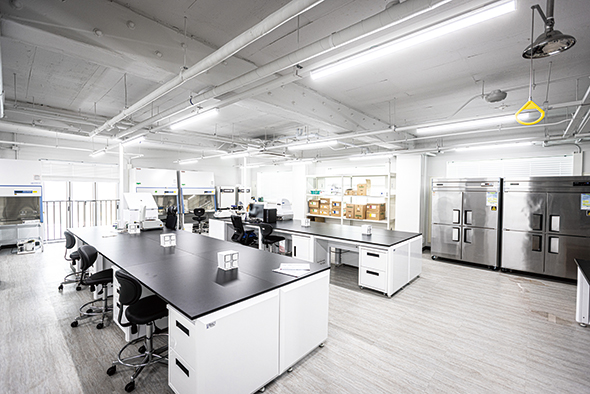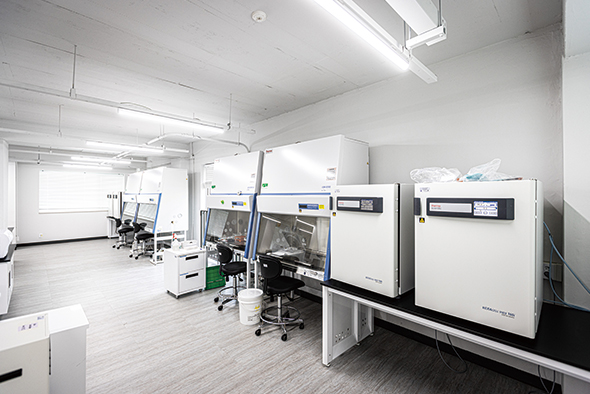

Story
날개가 된 생성형 AI
바이오 연구의 새 장을 열다
AI: The Catalyst for Progress – Ushering in a New Era of Biotech Research
한양맞춤의약연구원 디지털헬스연구센터장 정혜영 교수(ERICA캠퍼스 수리데이터사이언스학과)
Professor Hye-Young Jung (Department of Mathematical Data Science, ERICA Campus),
Director of HYU Digital Health Research Center at Hanyang Institute for Precision Therapeutics (HY-IPT)
- 글 박영임
- 사진 손초원
- Writing Park Yeong-im
- Photograph Son Cho-won
Scroll Down
The Hanyang Institute for Precision Therapeutics (HY-IPT) combines cutting-edge information and communication technology with biotechnology. The center focuses on bio big data analysis, bio artificial intelligence (AI), and advanced research in digital therapeutics and drug-target (DT) networks. It is poised to establish itself as a leading research hub at Hanyang University.

AI 시대 바이오 연구의 중추될 것
질병 치료를 위해 의약품 대신 소프트웨어 앱을 다운받는 시대가 도래했다. 바로 디지털 치료제 얘기다. 디지털 치료제 역시 전문 의약품처럼 의사의 처방전을 받아야 한다. 일반적인 의약품과의 차이라면 모바일 앱이나 소프트웨어, 웨어러블 장치 등 디지털 플랫폼에 접속해야 이용할 수 있다는 점이다. 글로벌 리서치 그룹 OpenPR은 디지털 치료제 시장이 2023년부터 2031년까지 연평균 28.6%의 성장률을 보일 것으로 예측했다. 이렇게 최첨단 정보통신 기술과 바이오 산업이 만나 탄생한 디지털바이오 분야는 디지털 치료제뿐 아니라 AI 융합 첨단 의료기기, AI 신약 개발 등 새로운 영역을 창출하며 미래 먹거리로 부상했다.
첨단바이오 산업의 성장을 예견한 한양대는 2022년 생명과학 연구와 바이오헬스 산업 발전을 위해 ‘한양맞춤의약연구원(Hanyang Institute for Precision Therapeutics; HY-IPT)’을 개원했다. 한양맞춤의약연구원은 연구 내용 특성에 따라 4개의 센터로 나뉘는데, △맞춤신약연구개발센터 △맞춤면역의약연구센터 △디지털헬스연구센터 △나노테라노스틱스연구센터가 그것이다. 이중 디지털헬스연구센터는 신약 개발 및 질병 관련 실험, 바이오데이터를 이용한 모델링과 인공지능 관련 연구를 담당하고 있다. 디지털헬스연구센터장을 맡은 정혜영 교수는 바이오 산업이 의료, 농업, 에너지 등 다양한 분야에서 광범위하게 활용될 분야라고 강조했다.
“바이오 산업은 최근 인구 고령화, 기후변화처럼 인류가 직면한 과제에 대응할 수 있는 중요한 수단으로 부각되고 있습니다. 디지털헬스연구센터는 데이터가 원유가 되는 4차 산업혁명 시기, 급속히 발전하고 있는 AI 시대의 바이오 연구에서 중추적인 역할을 맡게 될 것입니다.”
현재 디지털헬스연구센터에는 10명의 교수가 참여하며 바이오 빅데이터 연구, 바이오 인공지능 연구, 질환 조기 진단 마커 발굴 연구 등을 진행 중이다. 유전체, 임상자료 등 다양한 바이오 빅데이터를 정밀하게 분석하면 조기에 질병을 진단할 수 있고, 개인 유전자 정보를 기반으로 한 맞춤형 의료 서비스의 자양분을 제공할 수 있다. 특히 방대한 양의 문헌 탐구 및 임상실험을 거쳐야 하는 신약 개발 시 인공지능, 빅데이터 분석을 이용하면 임상실험의 탐색 범위와 단계를 줄여 개발 기간을 대폭 단축할 수 있다.
“코로나 팬데믹을 겪으며 디지털바이오의 역할이 더욱 중요해졌습니다. 향후 유사한 위협에 대응하기 위해 디지털바이오 분야에 대한 투자가 증가하는 추세입니다. AI를 활용한 신약 개발 시장은 2019년 4억 7340만 달러에서 연평균 28.6% 성장해 2027년 35억 4860만 달러 규모에 달할 것으로 전망됩니다.”
Artificial Intelligence Era: The Backbone of Bio Research
We have entered an era where software applications, rather than traditional medication, are being used to treat diseases—this marks the rise of digital therapeutics. Like conventional drugs, digital therapeutics require a doctor's prescription, but instead of pills, they are delivered through digital platforms such as mobile apps, software, or wearable devices. According to global research group OpenPR, the digital therapeutics market is expected to grow at an average annual rate of 28.6% from 2023 to 2031. This field, born from the convergence of advanced information technology and biotechnology, has become a key driver of future growth. In addition to digital therapeutics, it is also opening new frontiers in areas like AIintegrated medical devices and AI-powered drug development.
Anticipating the growth of the advanced biotech industry, Hanyang University established the Hanyang Institute for Precision Therapeutics (HY-IPT) in 2022 to foster life science research and advance the biohealth sector. The institute is divided into four centers based on their research focus: New Drugs Research and Development Center, Immunology and Drugs Research and Development Center, Digital Health Research Center, and Nano Theranostics Research Center. Among these, the Director of Digital Health Research Center is responsible for new drug development and disease-related experiments, as well as modeling and AI research using bio data. Professor Hye-Young Jung, who heads the Director of Digital Health Research Center, emphasized that the bio industry is poised to make significant impacts across various fields, including healthcare, agriculture, and energy.
“The bio industry has recently become a vital resource for tackling global challenges like population aging and climate change. In this age of the 4th Industrial Revolution, where data is considered the new oil and AI is advancing rapidly, the Digital Health Research Center is positioned to play a key role in driving innovation in bio research.”
The Digital Health Research Center is home to a team of 10 professors conducting cutting-edge research in areas such as bio big data analysis, bio artificial intelligence, and the identification of early disease diagnosis markers. By thoroughly analyzing various types of bio big data, including genomic and clinical data, the center aims to detect diseases at early stages and pave the way for personalized medical services tailored to individual genetic profiles. In the area of new drug development, which traditionally involves extensive literature reviews and lengthy clinical trials, the integration of AI and big data analysis can greatly accelerate the process. This approach helps narrow the scope of clinical trials and reduces the number of stages required, significantly shortening the overall drug development timeline.
“The COVID-19 pandemic has underscored the critical importance of digital biotechnology. To prepare for similar threats in the future, there's a growing trend of increased investment in the digital bio field. The market for AI-driven new drug development is projected to skyrocket from USD 473.4 million in 2019 to a staggering USD 3.55 billion by 2027, boasting an impressive annual growth rate of 28.6%.”
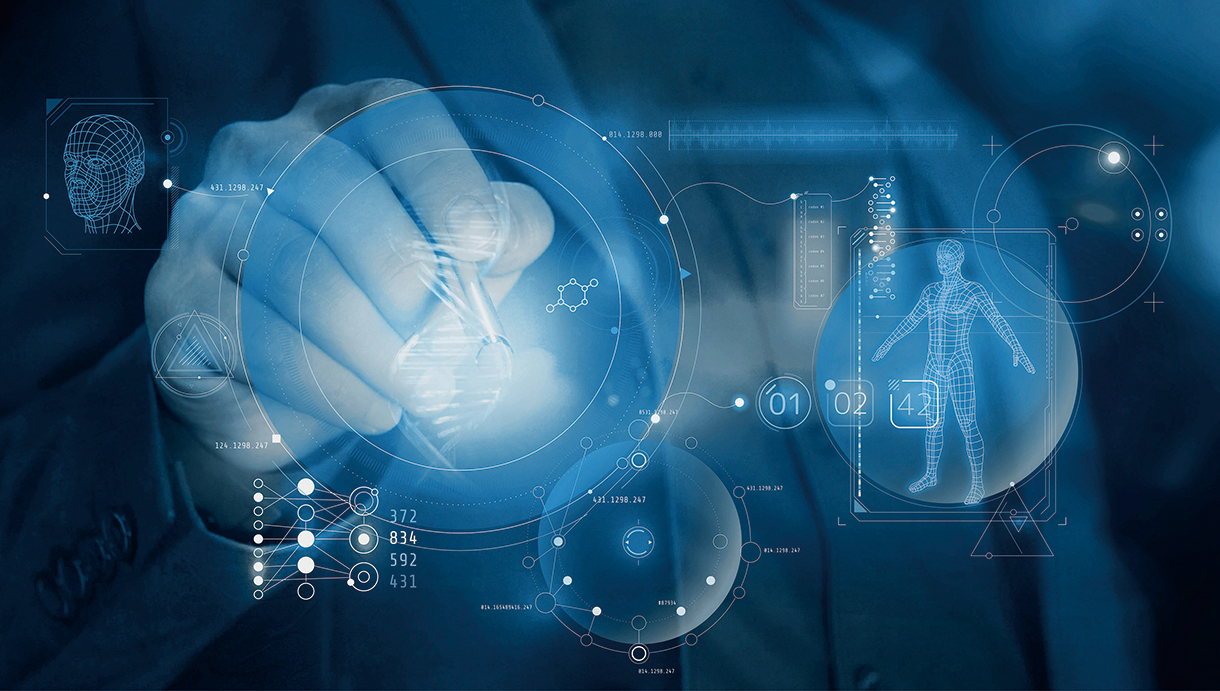
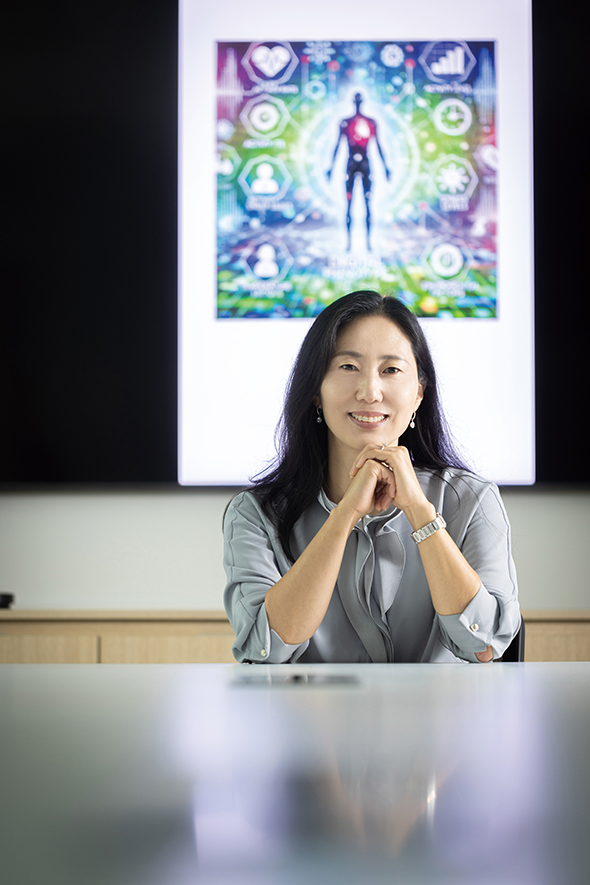
디지털 기기로 우울증을 진단?
이렇게 전 세계적으로 바이오 빅데이터 및 인공지능 신약 개발에 대한 연구가 활발히 이뤄지면서 새로운 연구 분야가 속속 등장하고 있다. 최근 ‘네트워크 의학(Network Medicine)’이라는 분야가 주목받고 있는데, 생물학적 네트워크를 활용해 질병의 복잡성을 이해하고 이를 통해 신약 개발 및 맞춤형 치료법을 개발하는 접근법이다.
“네트워크 의학은 유전자, 단백질, 대사물질 등 다양한 생물학적 요소 간의 상호작용을 네트워크로 모델링하는 것입니다. 이러한 네트워크는 노드(요소)와 엣지(상호작용)로 구성되며, 질병이 네트워크의 특정 패턴을 통해 발현된다고 가정합니다. 이를 통해 질병과 관련된 핵심 노드와 상호작용을 식별하고, 이를 타깃으로 하는 신약을 개발합니다.”
한편, 코로나 팬데믹 후 정신건강에 대한 관심이 높아지면서 우울증 치료를 위한 디지털 치료제까지 등장했다. 스마트폰과 같은 개인용 디지털 기기를 통해 신체 활동, 수면 패턴, 식습관, 약물 복용 순응도와 전화 사용 패턴, 오디오 녹음 등 디지털 기기 사용 데이터, GPS를 통한 위치, 환경광 같은 맥락 정보 등을 수집할 수 있는데 이를 디지털 표현형이라고 한다. 디지털 표현형을 분석해 심리 상태를 식별하면 조현병이나 우울증 같은 질병을 예측할 수 있다.
“2022년 글로벌 디지털 표현형 시장은 15억 7천만 달러로 커졌으며 2030년에는 34억 6천만 달러에 이를 것으로 예상됩니다. 디지털 표현형이라는 혁명적인 기술은 기존 정신건강 관리법의 한계를 극복할 수 있는 방법이에요. 이미 알츠하이머 환자들에게 적용되고 있죠. 스마트폰, 웨어러블 디바이스 및 가정 기반 센서와 같은 원격 모니터링 기술(RMT)을 사용해 환자의 보행 패턴 및 속도, 운동 작업, 공간 탐색, 계획 및 재정 관리 등 일상 활동을 측정해 질병 진행을 모니터링할 수 있습니다. 이를 통해 행동 및 인지 기능 저하를 식별하고 더 심각한 장애의 발생을 방지할 수 있지요.”
Diagnosing Depression with Digital Devices?
As Bio Big Data and AI-driven new drug development gain momentum worldwide, new research fields are emerging at a rapid pace. One such area that's been turning heads lately is “network medicine.” This innovative approach leverages biological networks to unravel the complexity of diseases, paving the way for novel drug development and personalized treatment strategies.
“Network medicine models the interactions between various biological elements such as genes, proteins, and metabolites as a network. These networks consist of nodes (elements) and edges (interactions), with the assumption that diseases manifest through specific patterns within the network. This approach enables the identification of core nodes and interactions linked to diseases, paving the way for targeted drug development.”
In the aftermath of the COVID-19 pandemic, as mental health issues have gained greater attention, digital therapeutics for treating depression have come to the forefront. These solutions utilize what's known as a digital phenotype—the collection of data from personal digital devices like smartphones. This includes monitoring physical activity, sleep patterns, eating habits, medication adherence, phone usage, audio recordings, GPS location, and ambient light exposure. By analyzing these digital footprints, it's possible to assess psychological states and even predict conditions such as schizophrenia or depression. This technological approach is opening up new possibilities in mental health care, providing innovative methods to monitor and manage mental well-being in an increasingly digital world.
“The global digital phenotype market reached USD 1.57 billion in 2022 and is projected to grow to USD 3.46 billion by 2030. Digital phenotype, a groundbreaking technology, offers a way to overcome the limitations of traditional mental health management. It is already being used with Alzheimer's patients. Through remote monitoring technology (RMT) such as smartphones, wearable devices, and home-based sensors, we can track patients' daily activities, including gait patterns, motor tasks, spatial navigation, planning, and financial management. This allows for continuous monitoring of disease progression, helping to detect declines in behavioral and cognitive functions and potentially prevent the onset of more severe disabilities.”
한양대는 2022년 신약 개발 및 질병 관련 실험, 바이오데이터를 이용한 모델링과 인공지능 관련 연구를 담당하는 한양맞춤의약연구원 디지털헬스연구센터를 설립한 바 있다
Hanyang University established the Digital Health Research Center at the Hanyang Institute for Precision Therapeutics (HY-IPT) in 2022. This center is responsible for new drug development and disease-related experiments, as well as modeling using bio data and research related to AI.
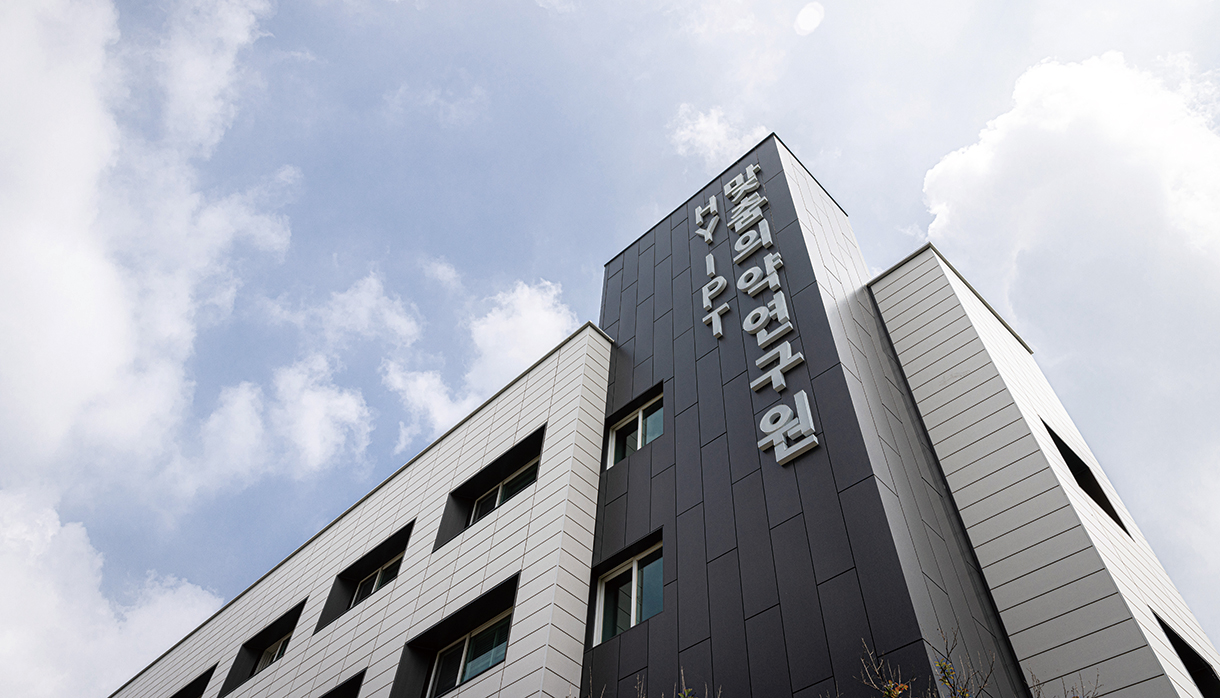
디지털바이오 R&D 투자 확대 기대
우리나라의 디지털바이오 연구 역량은 어느 정도일까. 지난 6월 국가과학기술자문위원회 산하 글로벌 R&D 특별위원회가 발표한 글로벌 R&D 전략 지도에 따르면, 우리나라는 첨단바이오 분야 글로벌 기술 수준에서 합성 생물학 7위, 유전자 세포치료 9위, 감염병 백신 치료 11위, 디지털 헬스 데이터 분석 활용 7위로 분석됐다. 그밖에 인공지능 분야는 효율적 학습 및 AI 인프라 고도화 4위, 첨단 AI 모델링 및 의사결정 5위, 안전 및 신뢰 AI 5위, 산업활용 및 혁신 AI 16위로 알려졌다. 정혜영 교수는 우리나라가 디지털바이오 분야에서 우위를 차지하려면 양질의 바이오데이터 공유 및 디지털바이오 분야의 R&D 투자 확대를 위해 국가 차원에서 적극적으로 지원해야 한다고 강조했다.
“우리나라는 인터넷 강국입니다. 그에 따라 방대한 데이터를 축적하고 있습니다. 디지털바이오 기술 분야에서 마땅히 1위에 올라야 할 나라죠. 그런데 개인정보 공유에 대한 규제가 관련 산업 발전의 저해 요소가 되고 있습니다. 하지만 개인정보 전송요구권을 골자로 하는 마이데이터 사업이 확대되고 있어 머지않아 개인 의료 정보를 다양한 기관이 공유할 수 있게 될 것입니다. 그러면 디지털바이오 산업 분야가 더욱 활성화될 것으로 기대됩니다.”
이제 막 열리기 시작한 디지털바이오 시대에 선제적으로 대응하기 위해 설립된 디지털헬스연구센터, 그 역할도 그만큼 커질 것이다. 국가의 미래 비전으로 제시되고 있는 디지털바이오 분야의 연구를 선도하기 위해 정부출연연구소를 비롯한 대형 병원, 바이오 기업과의 융합연구가 활발히 진행될 것으로 보인다. 더욱이 한양대 ERICA 캠퍼스혁신파크와 한양대학교병원, 안산 바이오단지 간의 시너지를 통해 디지털헬스연구센터의 장기적인 성장이 전망된다.
“디지털헬스연구센터는 디지털바이오 산업을 선도하는 융합연구가 활발히 이루어질 수 있는 연구 환경을 확보하고 있습니다. 바이오는 환경문제와도 연결되고, 빅데이터 분석, 인공지능 등 다양한 공학 분야와도 융합됩니다. 한양대 학생들이 각자의 전공을 기반으로 바이오와 접목할 수 있는 방법을 찾는다면 바이오 산업을 이끌 미래 인재로 성장할 수 있을 것입니다.”
Anticipating Increased Research and Development Investment in the Digital Biotech Sector
How advanced is Korea's digital biotech research? According to the Global R&D Strategy Map, released in June by the Global R&D Special Committee under the National Science and Technology Advisory Council, South Korea ranks 7th in the advanced bio field, 9th in gene and cell therapy, 11th in infectious disease vaccine development, and 7th in digital health data analysis globally. In the field of AI, the country ranks 4th in efficient learning and AI infrastructure, 5th in AI modeling and decision-making, 5th in safety and trusted AI, and 16th in industrial application and innovation AI. Professor Jung emphasized that for Korea to secure a competitive advantage in the digital bio sector, the government must actively promote the sharing of high-quality bio data and significantly increase R&D investment in digital biotechnology at the national level.
“Korea is a powerhouse in internet technology, which has allowed us to accumulate vast amounts of data. We should naturally be at the forefront of digital biotechnology. However, strict regulations on personal information sharing have been limiting the growth of related industries. Fortunately, the expansion of the MyData initiative, which focuses on the right to data portability, indicates that institutions will soon be able to share individual medical information. This progress is expected to provide a substantial boost to the digital biotechnology sector.”
As we enter the dawn of the digital biotechnology era, the Digital Health Research Center, established to proactively navigate this emerging frontier, is positioned to play an increasingly vital role. To lead research in digital biotechnology, which is being promoted as a key national vision for the future, we anticipate a surge in collaborative efforts involving government-funded research institutes, leading hospitals, and biotech companies. Furthermore, the long-term growth prospects for the Digital Health Research Center are promising, bolstered by the expected synergies between Hanyang University's ERICA Campus Innovation Park, Hanyang University Hospital, and the Ansan Bio Cluster. This strategic alignment is set to create a hub for innovation and research in digital health.
“The Digital Health Research Center has established a research environment conducive to pioneering convergence studies in the digital bio industry. Bio intersects with environmental issues and integrates with various engineering fields, including Big Data Analysis and AI. If Hanyang University students can find ways to combine their respective majors with biotechnology, they have the potential to become future leaders driving the Bio industry forward.”
